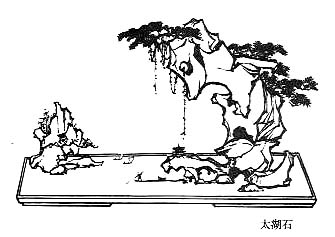道
德
經
Dao De Jing 
 – The Way and Its Power
– The Way and Its Power
The naturalist, individualist and politic doctrine of Lao-tse exhibited in 81 poetic and obscure texts. Tr. Waley (en), Lau (en), Julien (fr) and Wilhelm (de).
| 1 | 2 | 3 | 4 | 5 | 6 | 7 | 8 | 9 | 10 | 11 | 12 | 13 | 14 | 15 | 16 | 17 | 18 | 19 | 20 | 21 | 22 | 23 | 24 | 25 | 26 | 27 | ||
| 28 | 29 | 30 | 31 | 32 | 33 | 34 | 35 | 36 | 37 | 38 | 39 | 40 | 41 | 42 | 43 | 44 | 45 | 46 | 47 | 48 | 49 | 50 | 51 | 52 | 53 | 54 | ||
| 55 | 56 | 57 | 58 | 59 | 60 | 61 | 62 | 63 | 64 | 65 | 66 | 67 | 68 | 69 | 70 | 71 | 72 | 73 | 74 | 75 | 76 | 77 | 78 | 79 | 80 | 81 |
Daodejing I. 13.
第 一 十 三 Section Dao – Chapter XIII
Favour and disgrace goad as it were to madness; high rank hurts keenly as our bodies hurt.”
What does it mean to say that favour and disgrace goad as it were to madness? It means that when a rule's subjects get it they turn distraught, when they lose it they turn distraught. That is what is meant to by saying favour and disgrace goad as it were to madness. What does it mean to say that high rank hurts keenly as our bodies hurt? The only reason that we suffer hurt is that we have bodies; if we had no bodies, how could we suffer?
Therefore we may accept the saying: “He who in dealing with the empire regards his high rank as through it were his body is the best person to be entrusted with rules; he who in dealing with the empire loves his subjects as one should love one's body is the best person to whom one commit the empire.”
Waley 13
世人得失名利的心太重, 所以得到荣宠和受到曲辱都身惊害怕.为什么呢? 因为在世人心目中, 荣宠就觉得高贵, 因而怕失去荣宠。屈辱是低下的, 受到屈辱就感到丢人, 所以害怕受屈辱。
我们之所以有大的祸患, 那是因为我们常想到“自己”的关系。假设我们忘掉“自己”那么还有什么祸患呢。
所以, 如果有一个人愿意牺牲自己为天下人服务, 就可以把天下交给他。
白话翻译
Favor and disgrace are things that startle;
High rank is, like one's body, a source of great trouble.
What is meant by saying favor and disgrace are things that startle?
Favor when it is bestowed on a subject serves to startle as much aswhen it is withdrawn.
This is what is meant by saying that favor and disgrace are thingsthat startle.
What is meant by saying that high rank is, like one's body, a sourceof great trouble?
The reason I have great trouble is that I have a body.
When I no longer have a body, what trouble have I?
Hence he who values his body more than dominion over the empire canbe entrusted with the empire.
He who loves his body more than dominion over the empire can be giventhe custody of the empire.
Lau 13
Le sage redoute la gloire comme l'ignominie ; son corps lui pèse comme une grande calamité.
Qu'entend-on par ces mots : il redoute la gloire comme l'ignominie ?
La gloire est quelque chose de bas. Lorsqu'on l'a obtenue, on est comme rempli de crainte ; lorsqu'on l'a perdue, on est comme rempli de crainte.
C'est pourquoi l'on dit : il redoute la gloire comme l'ignominie.
Qu'entend-on par ces mots : son corps lui pèse comme une grande calamité ?
Si nous éprouvons de grandes calamités, c'est parce que nous avons un corps.
Quand nous n'avons plus de corps (quand nous nous sommes dégagés de notre corps), quelles calamités pourrions-nous éprouver ?
C'est pourquoi, lorsqu'un homme redoute de gouverner lui-même l'empire, on peut lui confier l'empire ; lorsqu'il a regret de gouverner l'empire, on peut lui remettre le soin de l'empire.
Julien 13
Gnade ist beschämend wie ein Schreck.
Ehre ist ein großes Übel wie die Person.
Was heißt das : Gnade ist beschämend wie ein Schreck?
Gnade ist etwas Minderwertiges.
Man erlangt sie und ist wie erschrocken.
Man verliert sie und ist wie erschrocken.
Das heißt: Gnade ist beschämend wie ein Schreck.
Was heißt das: Ehre ist un großes Übel wie die Person?
Der Grund, warum ich große Übel erfahre, ist,
daß ich eine Person habe.
Habe ich keine Person,
was für Übel konnte ich dann erfahren?
Darum: Wer in seiner Person die Welt ehrt,
dem kann man wohl die Welt anvertrauen.
Wer in seiner Person die Welt liebt,
dem kann man wohl die Welt übergeben.
Wilhelm 13
C'est pourquoi, lorsqu'un homme redoute de gouverner lui-même l'empire, on peut lui confier l'empire ; lorsqu'il a regret de gouverner l'empire, on peut lui remettre le soin de l'empire.
il n'apparait nullement le mot CORPS alors que dans les 2 versions anglaise celui-ci apparait deux fois
Cette dernières phrases en français n'a pas de sens par rapport aux phrases précédentes !!!
N'y aurait-il pas un problèmes de traduction sur cette phrase ???

The Way and Its Power – Dao De Jing I. 13. – Chinese on/off – Français/English
Alias Daode Jing, Dao De Jing, Tao Te Ching, Tao Teh Ching, le Tao-tö-king, Lao-Tzu Te-Tao Ching, the Laozi, Lao Zi, the Lao Tze, le Lao-tseu, The Book of the Way and its Virtue, the Way and its Power.
The Book of Odes, The Analects, Great Learning, Doctrine of the Mean, Three-characters book, The Book of Changes, The Way and its Power, 300 Tang Poems, The Art of War, Thirty-Six Strategies
Welcome, help, notes, introduction, table.
Index – Contact – Top
